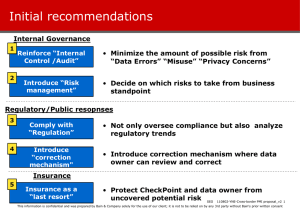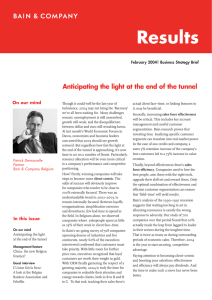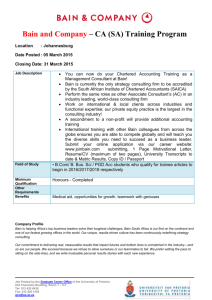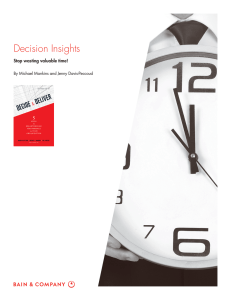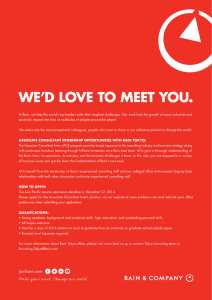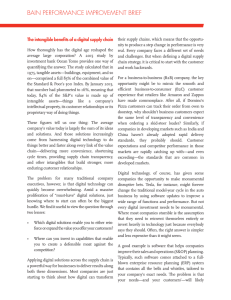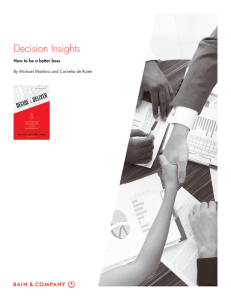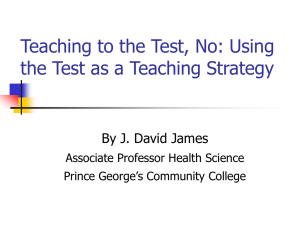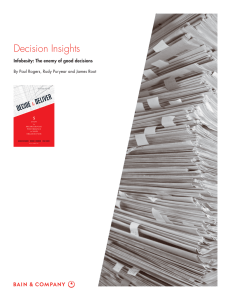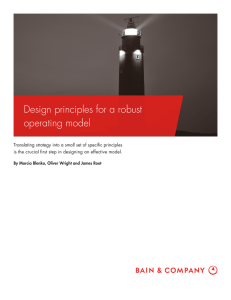Essential Bain - Students
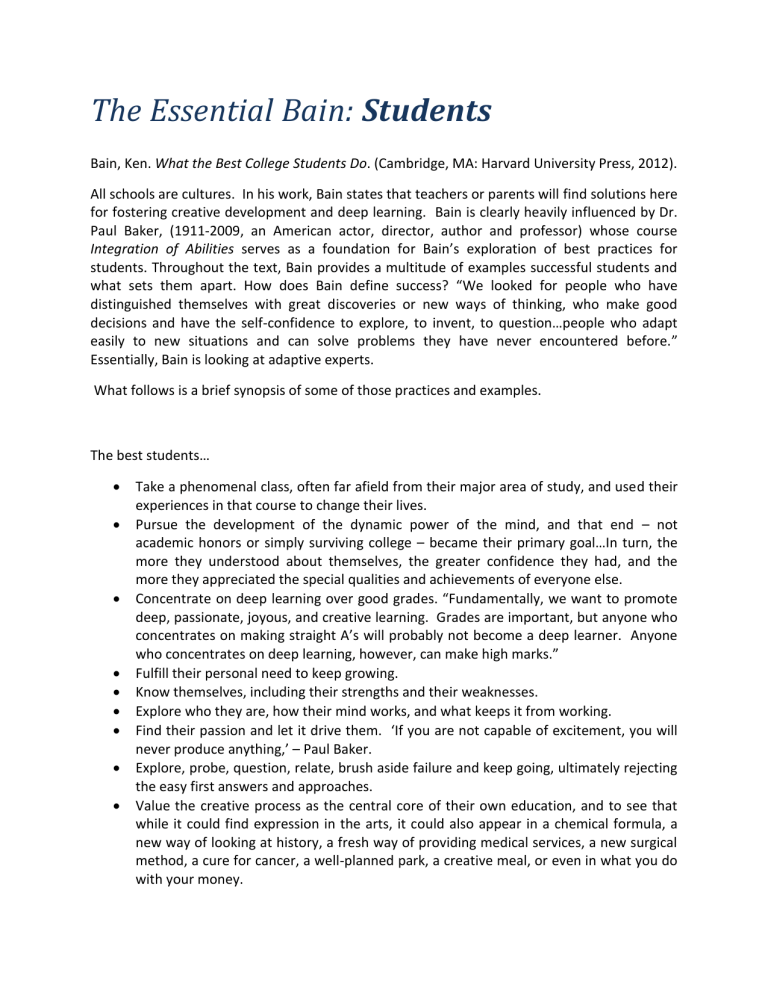
The Essential Bain: Students
Bain, Ken. What the Best College Students Do. (Cambridge, MA: Harvard University Press, 2012).
All schools are cultures. In his work, Bain states that teachers or parents will find solutions here for fostering creative development and deep learning. Bain is clearly heavily influenced by Dr.
Paul Baker, (1911-2009, an American actor, director, author and professor) whose course
Integration of Abilities serves as a foundation for Bain’s exploration of best practices for students. Throughout the text, Bain provides a multitude of examples successful students and what sets them apart. How does Bain define success? “We looked for people who have distinguished themselves with great discoveries or new ways of thinking, who make good decisions and have the self-confidence to explore, to invent, to question…people who adapt easily to new situations and can solve problems they have never encountered before.”
Essentially, Bain is looking at adaptive experts.
What follows is a brief synopsis of some of those practices and examples.
The best students…
Take a phenomenal class, often far afield from their major area of study, and used their experiences in that course to change their lives.
Pursue the development of the dynamic power of the mind, and that end – not academic honors or simply surviving college – became their primary goal…In turn, the more they understood about themselves, the greater confidence they had, and the more they appreciated the special qualities and achievements of everyone else.
Concentrate on deep learning over good grades. “Fundamentally, we want to promote deep, passionate, joyous, and creative learning. Grades are important, but anyone who concentrates on making straight A’s will probably not become a deep learner. Anyone who concentrates on deep learning, however, can make high marks.”
Fulfill their personal need to keep growing.
Know themselves, including their strengths and their weaknesses.
Explore who they are, how their mind works, and what keeps it from working.
Find their passion and let it drive them. ‘If you are not capable of excitement, you will never produce anything,’ – Paul Baker.
Explore, probe, question, relate, brush aside failure and keep going, ultimately rejecting the easy first answers and approaches.
Value the creative process as the central core of their own education, and to see that while it could find expression in the arts, it could also appear in a chemical formula, a new way of looking at history, a fresh way of providing medical services, a new surgical method, a cure for cancer, a well-planned park, a creative meal, or even in what you do with your money.
Recognize the importance of attitude over ability. They stick with assignments much longer and are always reluctant to give it up. ‘I haven’t learned it yet.’ They might say, while others would cry, ‘I’m not good at’ history, music, math, writing, or whatever.
Realize their uniqueness, defined their values, and found a purpose and meaning for their studies and lives
Found within themselves a way to motivate their work. That intrinsic motivation became their driving force.
Develope a flexible mindset for themselves in which they came to appreciate their unique qualities, their strengths and weaknesses, and their capacity to grow
Think about their own thinking while they are thinking. That process, called
METACOGNITION, allows people to engage in a valuable conversation with themselves, exploring their background, questioning and correcting their thinking in the process, and pursuing the dynamic power of their own minds.
Appreciate the messy quality of life and its great questions and the difficulty of drawing conclusions
Possess an enhanced capacity for empathy. The capacity for self-comfort – more than any notions of self-esteem – allowed them to confront their own weaknesses and look for areas of growth.
Live balanced lives and learn from a rich assortment of fields, rather than from one narrow discipline.
Comprehend what difference an idea, line of reasoning, or fact made, and how it related to something they had already learned.
Possess the ability and the attitude both to recognize and even to relish the opportunity and necessity for invention.
Enjoy and know how to improvise, invent, and overcome unexpected obstacles.
Take control of their own education and decide what they want to understand
Thought a great deal about how new information either supported or changed something they already believed, and they asked themselves constantly how well they understood the material.
Ignore extrinsic motivators like high marks and to find intrinsic reasons for their studies.
Rediscover the curiosity of childhood.
Find great pleasure in learning how to be creative and use their creativity in order to address some issue or achieve some goal that had become important to them.
Grasp that each of us can benefit from the special contributions of other people.
Seek meaning and purpose for their existence. Who am I? Why am I here? What is my role?”
Acknowledge the need for growth in themselves while appreciating the work of others.
Open a conversation with themselves that allows them to understand, control, and improve their own minds and work.
Define being smart based on how hard they try.
Bain also discusses the theory of “Three Brains:”
1.) Spock Brain – builds mental models, stores them (remembers stuff) and uses them to interpret new sensory input. Reasons and makes decisions. Can operate as either a.
Mindless – auto pilot or b.
Mindful – mindful people engaged in the ‘continuous creation of new categories,’ they possess an ‘openness to new information’ and they have ‘an implicit awareness of more than one perspective.’ They notice novelty and distinctions i.
Simply changing the words used with students can increase their mindfulness. All of us possess enormous power to change the world and ourselves by shifting the language and categories we employ. c.
Mindful learning produces pleasure while mindless approaches breed boredom.
Or as d.
Automatic or reflective thought
2.) Alligator Brain – fight or flee. If you get heavy doses of cortisol repeatedly, that injection can block your Spock brain from forming memories. That’ why under high stress, people sometimes can’t even remember their names. People who suffer from test anxiety simply let their alligator brains run wild.
3.) Pleasure Brain – a whole series of connection that find great joy in life. Part of their secret in tapping that pleasure potential came in enjoying the ride rather than looking only for a destination. They stopped focusing on results and became immersed in the process of creation.
As you become more annoyed, your alligator brain kicks in, causes part of your adrenal gland to squirt cortisol into your body, and then your Spock brain can’t even operate on automatic, let alone mindfully.
Bain saw the following patterns in how the best students learn to handle “Ill-structured” problems:
1.) They surrounded themselves with interesting and diverse sets of people, and they engaged in conversations with them about some of those messy, ill-structured problems.
2.) They didn’t let contrary views bother them emotionally; indeed, they welcome the chance to duke it out with someone who disagreed with them. Such attitudes reflected the humility with which they drew their own conclusions, and the constant appreciation of how wrong – or right – they could be, and it indicated their strong desire to understand the truth.
3.) They developed and maintained a fascination with the world, and they intended to understand deeply, often drawing on childhood experiences and interest.
4.) They engaged in original research on some ill-structured problem or question, and they did more than just Google (sic) it. They explored a question.
5.) They had the support of mentor, someone who helped them believe they could do it.
